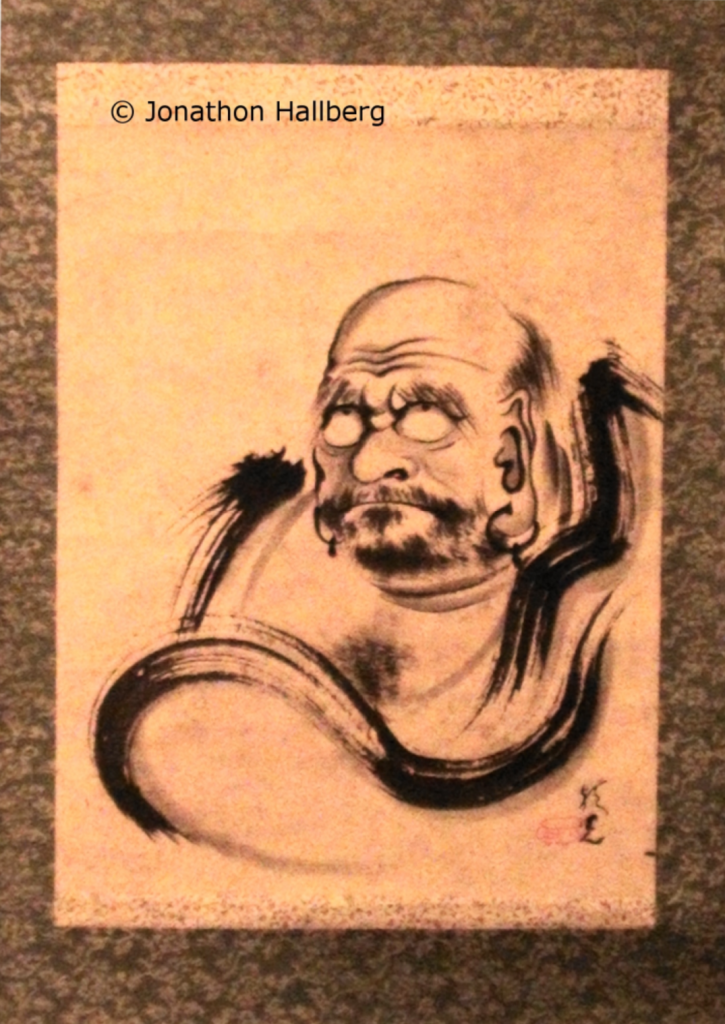A lot of people who study at a traditional karate dojo may have noted pictures of Daruma; that chubby, unshaven little fat bald guy who is supposed to be the father of martial arts.

In this image, Daruma certainly doesn’t look like a warrior monk, that’s for sure. So what’s the deal? Daruma means different things to different people. As previously mentioned, to some, he is associated with the roots of our martial traditions, having brought the warrior arts of his own Kshatrya castle in India to a Shaolin temple in China. (information taken from: “Daruma – Father of Zen Buddhism“). To others, Daruma personifies self-realization through meditation. And yet to others, he may mean yet other different things, some of them rather strange. Read on!
“Daruma” is the Japanese pronunciation of the founder of Zen (“Ch’an” in Mandarin) Buddhism. His Indian name was Bodhidharma and he apparently lived in either the 5th or 6th Century. In Japan, zen monks painted images of Daruma as a form of meditation and would reflect on the Daruma image to remind them of how to properly meditate (this is from memory after reading “Reflections on the Art of Living: A Joseph Campbell Companion, edited by Diane K. Osbon, 1985). Daruma was a pro at meditation, to say the least. He is said to have cut out his eyelids to ensure concentration. He is said to have stared at a cave wall in sazen so long (nine years) that his shadow burned an image into the rock for lack of sun exposure. He is also said to have lost the use of his legs due to sitting in meditation for so long. The root word for Zen is a Sanskrit word; dhyana, meaning “absorption” or “meditative state.” (information taken straight from good old Wikipedia).
Also, Daruma is known as a protector of children and a good luck symbol. The Daruma doll is sold with no pupils in the eyes; when one sets about a major goal, they paint a pupil and then paint the second pupil when the goal is achieved. This darmuma doll is legless and made of paper-mache. A popular saying about Daruman is that he “falls seven times and rises eight times” (nana korobi ya oki). Thus, Daruma is also associated with sexual potency and also getting over an illness. Many sources provide this information, but I gleaned it from Dr. Grabi Greve’s great blog on Daruma.
It is quite possible that many Japanese karate instructors are simply followers of Zen tradition and have an image of Daruma in the dojo for that reason alone. They could have the image as a reverent reminder of the ancientness of the art they study and propagate. They could be paying homage to a deity figure for any of the above reasons or for other reasons (read the link). The Daruma legend is very convoluted and, many say, apocryphal. Some say that, after visiting China, Daruma returned to India. Others say he went to Japan. Daruma is said to have crossed a river on the edge of a reed, told off kings and risen from the grave to return to India, leaving only one shoe in his tomb. He was many things to different people and perhaps his symbolism can teach us more about life than whatever the facts of his life really are.
I have a great painting of Daruma that I found in an antique and junk store near the back entrance to Heiwa Dori (Peace Street Market) from Tsuboya Dori in Naha, Okinawa. I think the Daruma image is a good personification of “mushin” (no mind, or empty mind). It reminds me of my time in Okinawa and also reminds me to “keep it simple” in my training and in my life. Easy to say; hard to do.

